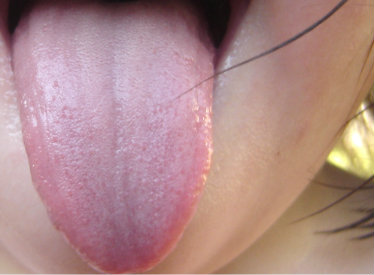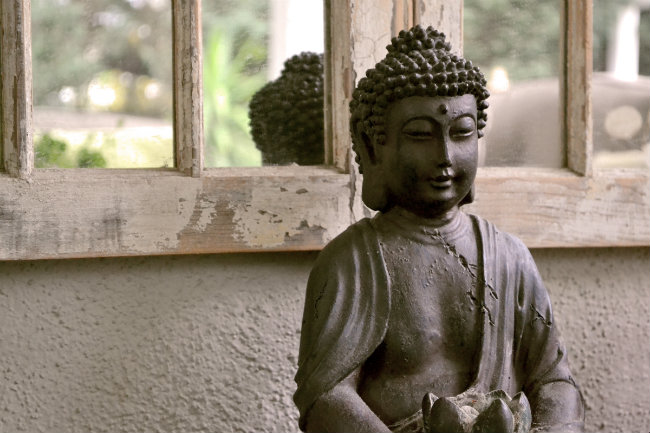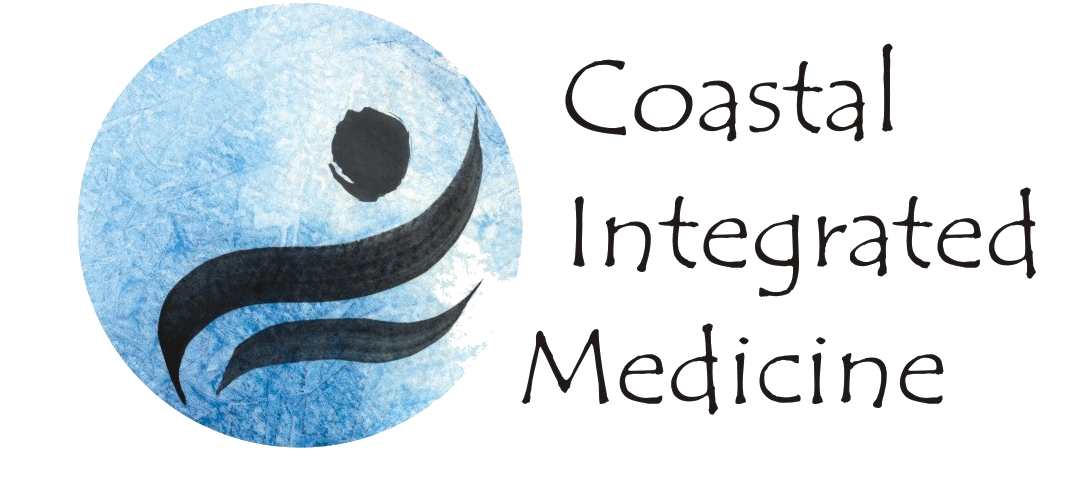 TCM Tongue Diagnosis Many people are surprised when asked to show their tongue during an acupuncture treatment so I thought I’d shed some light on it. The tongue is an incredibly important diagnostic tool in Traditional Chinese Medicine. The color, coating, shape and texture of the tongue reflect the state of your health. The color of your tongue can change daily and will tell a lot about what’s going on inside your body. The sensitive tissue of the tongue reacts to changes in digestion, pH, circulation and immune function. Here’s what your tongue is telling you… Color A healthy tongue will be pink or light red with a thin white coat on the surface. If there is excess heat in the body due to fever, inflammation or infection the tongue will be a bright red color. A purple tongue shows poor circulation and blood stagnation. A pale or white tongue can indicate low energy, fatigue and a weak immune system. The different zones of the tongue reflect different areas of the body. For example, the tip of the tongue reflects the health of the heart. A bright red tip can indicate a ‘restless heart’ causing insomnia. The mid-section of the tongue reflects the digestive system and a greasy coat here can indicate poor digestion. The sides of the tongue reflect the health of the liver. Bright red sides with no coating can indicate stagnation in the liver and high levels of stress. Coating Many people brush their tongue when brushing their teeth but it’s best to avoid brushing your tongue for 24 hours before your appointment. Your practitioner will...
TCM Tongue Diagnosis Many people are surprised when asked to show their tongue during an acupuncture treatment so I thought I’d shed some light on it. The tongue is an incredibly important diagnostic tool in Traditional Chinese Medicine. The color, coating, shape and texture of the tongue reflect the state of your health. The color of your tongue can change daily and will tell a lot about what’s going on inside your body. The sensitive tissue of the tongue reacts to changes in digestion, pH, circulation and immune function. Here’s what your tongue is telling you… Color A healthy tongue will be pink or light red with a thin white coat on the surface. If there is excess heat in the body due to fever, inflammation or infection the tongue will be a bright red color. A purple tongue shows poor circulation and blood stagnation. A pale or white tongue can indicate low energy, fatigue and a weak immune system. The different zones of the tongue reflect different areas of the body. For example, the tip of the tongue reflects the health of the heart. A bright red tip can indicate a ‘restless heart’ causing insomnia. The mid-section of the tongue reflects the digestive system and a greasy coat here can indicate poor digestion. The sides of the tongue reflect the health of the liver. Bright red sides with no coating can indicate stagnation in the liver and high levels of stress. Coating Many people brush their tongue when brushing their teeth but it’s best to avoid brushing your tongue for 24 hours before your appointment. Your practitioner will...
 “The doctor of the future will give no medication, but will interest his patients in the care of the human frame, diet and in the cause and prevention of disease. ” ~ Thomas Edison I have been in practice for well over ten years now and have learned so much about health, people, patterns and the human body. When I was a student I was intrigued by so many of the concepts and mysteries of Traditional Chinese Medicine. I was fascinated with every facet of it. How could a person be diagnosed by changes in the pulse, tongue and complexion? How could personality traits indicate with great accuracy the type of illness a person would be susceptible to? There were so many questions and mystery. I was in awe of it all. As the years went by and I treated more and more people, I began to really understand TCM. It was not magical or mysterious, it was based on concrete observable patterns. Yes, the tongue does reflect the health with great accuracy. The tongue is an extension of the esophagus which connects to the stomach. Inflammation and acidity that originate in the stomach will show on the tongue. It’s not a mystery just simple observation; like paleness under the eyelid when a person is anemic. If you see hundreds of tongues, after awhile you see patterns. The part reflects the whole. TCM diagnosis and treatment is the culmination of 2000 years of careful observation and recognition of patterns in the body. The tongue is only one method of ‘reading’ the body. The pulse, complexion, voice, body type, hair...
“The doctor of the future will give no medication, but will interest his patients in the care of the human frame, diet and in the cause and prevention of disease. ” ~ Thomas Edison I have been in practice for well over ten years now and have learned so much about health, people, patterns and the human body. When I was a student I was intrigued by so many of the concepts and mysteries of Traditional Chinese Medicine. I was fascinated with every facet of it. How could a person be diagnosed by changes in the pulse, tongue and complexion? How could personality traits indicate with great accuracy the type of illness a person would be susceptible to? There were so many questions and mystery. I was in awe of it all. As the years went by and I treated more and more people, I began to really understand TCM. It was not magical or mysterious, it was based on concrete observable patterns. Yes, the tongue does reflect the health with great accuracy. The tongue is an extension of the esophagus which connects to the stomach. Inflammation and acidity that originate in the stomach will show on the tongue. It’s not a mystery just simple observation; like paleness under the eyelid when a person is anemic. If you see hundreds of tongues, after awhile you see patterns. The part reflects the whole. TCM diagnosis and treatment is the culmination of 2000 years of careful observation and recognition of patterns in the body. The tongue is only one method of ‘reading’ the body. The pulse, complexion, voice, body type, hair...
 The Effects of Fall According to Traditional Chinese Medicine The days are getting shorter, the leaves are getting crisper and Fall is in the air. Fall is a time for looking inward and quiet contemplation. It is a time of reflection and creativity. According to Traditional Chinese Medicine (TCM), each season affects the body and mind in a different way. The change of seasons is a time of dynamic change for the internal organs and it is during these seasonal transitions that we are most susceptible to getting sick. In Chinese Medicine Fall is the season of the ‘Metal’ element. Metal is associated with the emotion of grief or sadness and affects the physical body through the lungs and large intestine. This means that in the Fall we are more susceptible to colds and flu’s with runny nose, cough and fatigue. It is also the time of year where our ‘wei qi’ (immune system) is low and a simple cold can turn into something much more serious for those with weakened immunity. We often see people hit hard with bronchitis and pneumonia around this time of year. Each emotion affects the body in a different way. The emotion of sadness or grief has an inverse relationship with the lungs. Grief or extreme sadness weakens the lungs and can cause physical symptoms such as shortness of breath, asthma or even pneumonia and conversely lung problems can cause a feeling of sadness. It is not uncommon for someone who is grieving the loss of a loved one to develop bronchitis. Constipation is another symptom that often appears in the Fall season....
The Effects of Fall According to Traditional Chinese Medicine The days are getting shorter, the leaves are getting crisper and Fall is in the air. Fall is a time for looking inward and quiet contemplation. It is a time of reflection and creativity. According to Traditional Chinese Medicine (TCM), each season affects the body and mind in a different way. The change of seasons is a time of dynamic change for the internal organs and it is during these seasonal transitions that we are most susceptible to getting sick. In Chinese Medicine Fall is the season of the ‘Metal’ element. Metal is associated with the emotion of grief or sadness and affects the physical body through the lungs and large intestine. This means that in the Fall we are more susceptible to colds and flu’s with runny nose, cough and fatigue. It is also the time of year where our ‘wei qi’ (immune system) is low and a simple cold can turn into something much more serious for those with weakened immunity. We often see people hit hard with bronchitis and pneumonia around this time of year. Each emotion affects the body in a different way. The emotion of sadness or grief has an inverse relationship with the lungs. Grief or extreme sadness weakens the lungs and can cause physical symptoms such as shortness of breath, asthma or even pneumonia and conversely lung problems can cause a feeling of sadness. It is not uncommon for someone who is grieving the loss of a loved one to develop bronchitis. Constipation is another symptom that often appears in the Fall season....
 Exercises for plantar fascitis (by Runners World: Body Shop) If you have ever dealt with plantar fascitis you’ll know that it can be very persistent and frustrating to deal with. Here is a video on 5 exercises that can help strengthen the foot and ankle, which addresses the real issue – weakness. Add adequate rest and ice and you’ll be back on your feet in no time! ~Think...
Exercises for plantar fascitis (by Runners World: Body Shop) If you have ever dealt with plantar fascitis you’ll know that it can be very persistent and frustrating to deal with. Here is a video on 5 exercises that can help strengthen the foot and ankle, which addresses the real issue – weakness. Add adequate rest and ice and you’ll be back on your feet in no time! ~Think...





